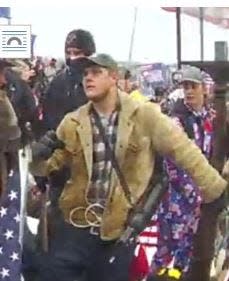Jan. 6 defendant from Polk City fights prosecutors' attempts to limit defense
Prosecutors and a lawyer representing a Polk City man have submitted dueling court filings over charges that he participated in the U.S. Capitol attack.
Joshua Doolin, 24, is one of six current or former Polk County residents charged in relation to the Jan. 6, 2021, insurrection. He is scheduled to go on trial next month in Washington, D.C.
Doolin was originally indicted in July 2021 on misdemeanor charges, including disorderly and disruptive conduct in a restricted building or grounds. Federal prosecutors released a superseding indictment in July that added a felony charge, obstructing, impeding or interfering with a law-enforcement officer.

Doolin’s lawyer, Allen Orenberg of Potomac, Maryland, filed a motion in late July asking U.S. District Judge Carl Nichols to dismiss the felony charge. Orenberg presented a detailed argument, suggesting that the law on which the charge rests is unconstitutionally vague and criminalizes protected speech.
In a response filed Friday, prosecutors opposed Doolin’s motion. The 16-page filing, signed by Assistant U.S. Attorneys Benet Kearney and Matthew Moeder, argued that several courts have written recent opinions rejecting the challenges raised in Doolin’s motion.
The prosecutors’ filing cited numerous previous federal rulings in seeking to demonstrate that Doolin’s challenge lacked merit. The prosecutors disputed Doolin’s claim that the charge depended upon laws that are vague or overly broad
Orenberg filed three motions Friday in response to prosecutors’ motions seeking to introduce video evidence and to limit defense arguments in Doolin’s trial.
Prosecutors submitted a motion on July 23 seeking to allow the use of video evidence taken from YouTube. In a response, Orenberg warned of the proliferation of “deepfakes” on the internet, arguing that prosecutors should be required to verify the authenticity of the video.
READ MORE ABOUT THE JAN. 6 DEFENDANTS WITH POLK TIES:
Jan. 6 defendant from Polk City wants new charge - a felony - dismissed
Report: Daughter of Publix founder paid $60,000 for Jan. 6 speech to Trump Jr.'s fiancee
One year later, Jan. 6 suspect Jonathan Pollock from Polk County hasn’t been caught
Orenberg also challenged a government motion to preclude certain defense arguments. Prosecutors have asked Nichols to block Doolin from arguing “entrapment by Estoppel,” the concept of receiving permission from a government official to commit an illegal act.
The government motion seeks to prevent Doolin from claiming that former President Donald Trump gave him and other supporters permission to enter the U.S. Capitol grounds through his repeated calls to stop certification of the 2020 election results. Orenberg, citing the case of U.S. v. Chrestman, wrote that Doolin likely would have a viable defense on the grounds that he did not believe he was trespassing at the Capitol that day.
Orenberg challenged prosecutors’ attempts to limit other defense arguments. Prosecutors have asked Nichols to preclude character evidence based on Doolin’s background as an emergency medical technician and arguments that showed “good conduct” on Jan. 6 by allegedly helping to protect an injured police officer.
Doolin’s lawyer also argued against a motion seeking to preclude any defense that would encourage jury nullification, an acquittal despite jurors’ belief that a defendant is actually guilty.
Finally, Orenberg responded to prosecutors’ motions to restrict details about Secret Service activities and the locations of surveillance cameras at the Capitol. The government has sought to limit the defense’s questioning of Secret Service officers on where protected officials are taken at the Capitol during emergencies and about the specific locations of cameras.
Orenberg wrote that prosecutors must be required to establish that a person protected by the Secret Service — presumably former Vice President Mike Pence — was present at the Capitol, thus making it a restricted building. Doolin’s lawyer also wrote that the judge should allow questions about the locations of cameras as a way to evaluate the credibility of witness testimony.
Prosecutors claim that Doolin traveled to Washington, D.C., with relatives and friends and moved together with them near the Capitol building on the afternoon of Jan. 6, 2021. He was indicted along with his cousins, Jonathan Pollock and Olivia Pollock of Lakeland; and friends Joseph Hutchinson III, formerly of Lakeland and now of Georgia; and Steven Perkins of Plant City.
Orenberg successfully motioned to have Doolin’s case severed from the others'.
Olivia Pollock, Hutchinson and Perkins were scheduled for trial in January, but a judge has delayed that until March. Jonathan Pollock has remained a fugitive since his indictment more than a year ago.
Two other Lakeland residents, Corinne Montoni and Brian Boele, were separately indicted in connection with the U.S. Capitol attack.
Gary White can be reached at gary.white@theledger.com or 863-802-7518. Follow on Twitter @garywhite13.
This article originally appeared on The Ledger: Capitol riot defendant Joshua Doolin fights prosecutors' limits on defense
